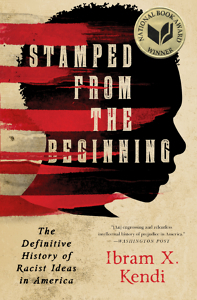 In bestowing the 2016 National Book Award for Nonfiction on Ibram X. Kendi’s Stamped From the Beginning: The Definitive History of Racist Ideas in America, the judges described the book as “a masterful voyage through the history of U.S. political rhetoric, beginning with Cotton Mather and ending with hip-hop.” Kendi’s long, sharp narrative stabs through the fabric of American history, forcing its readers to confront the way racist ideas have enforced racial inequalities. According to Kendi, we can envision a better future only by confronting the past.
In bestowing the 2016 National Book Award for Nonfiction on Ibram X. Kendi’s Stamped From the Beginning: The Definitive History of Racist Ideas in America, the judges described the book as “a masterful voyage through the history of U.S. political rhetoric, beginning with Cotton Mather and ending with hip-hop.” Kendi’s long, sharp narrative stabs through the fabric of American history, forcing its readers to confront the way racist ideas have enforced racial inequalities. According to Kendi, we can envision a better future only by confronting the past.
Kendi is an assistant professor of history at the University of Florida. He is the author of numerous articles in both academic journals and popular publications, as well as The Black Campus Movement. To research and write Stamped From the Beginning, he won a wide variety research fellowships, grants, and visiting appointments from universities, foundations, professional associations, and libraries. He answered questions via email from Chapter 16:
Chapter 16: You once explained that you wrote Stamped From the Beginning “for the lives they said don’t matter.” How did our contemporary debates about race shape this work of history? How did it emerge as a book meant for wide audiences, rather than just your fellow academics?
Ibram X. Kendi: I actually started writing Stamped shortly before the death of Trayvon Martin, and I was putting the finishing touches on the book around the time Americans were “saying the name” of Sandra Bland. So the debate about race and policing—and the racist and antiracist ideas rushing back and forth—were ever-present in my mind as I was penning Stamped. It gave me a sense of urgency and purpose. But it also reinforced my earlier decision to write a scholarly history of racist ideas that can be devoured by as many people as possible because racist ideas and their history affect us all.
Chapter 16: The book takes its title from an 1860 speech by Mississippi Senator Jefferson Davis, who argued against an education bill for Washington D.C. blacks by claiming that “the inequality of the white and black races” was “stamped from the beginning.” How did racist ideas shape the contours of early American history?
Kendi: Racist ideas were at the center of debates in early America. Davis espoused a theory of polygenesis, meaning every racial group had its own creation story and was a separate species. That is how he could claim black inferiority was stamped from the beginning: blacks were created unequally as an inferior species. This racist theory of polygenesis served to justify slavery—and as you know, early American history and slavery are practically interchangeable.
When slaveholders were not using polygenesis to justify slavery, they were using other racist ideas, like the notion that blacks had been cursed into slavery as the descendants of Ham. Even abolitionists espoused racist ideas, especially the supposition that slavery had made black people into brutes. It is one antiracist thing to say that slavery was dehumanizing. It is another racist thing to say that slavery actually did make black people into sub-humans.
 Chapter 16: You emphasize that racism is not simply the product of ignorance and hate, but rather that racist ideas were powerful tools to justify exploitation. Why is this distinction important?
Chapter 16: You emphasize that racism is not simply the product of ignorance and hate, but rather that racist ideas were powerful tools to justify exploitation. Why is this distinction important?
Kendi: How we imagine the roots of racist ideas determines our solutions for eliminating racist ideas. Racial reformers have been led to believe that ignorance and hate are the sources of racist ideas. As such, racial reformers have spent a lot of time over years trying to love and educate away racist ideas. In realizing that racist ideas have largely been produced by influential Americans to justify racist policies, and not out of ignorance or hate, racial reformers will now be able to realize why our educational and loving efforts have failed.
Chapter 16: Each of the book’s five sections revolves around one historical character, a compelling way to ground the reader in specific experiences. Somewhat surprisingly, you chose to center sections on the abolitionist William Lloyd Garrison and the civil-rights pioneer W.E.B. Du Bois. Why highlight racist ideas among these men, who accomplished so much for racial equality?
Kendi: I wanted to show that even the most well-meaning Americans who accomplished much for racial equality can espouse racist ideas. A racist idea is any idea that suggests a racial group is superior or inferior to another racial group in any way. Both Garrison and Du Bois believed that black people (especially poor black people) were culturally inferior and their history of oppression had made them inferior. Both activists spent crucial hours trying to civilize or develop black folk when black folk were already civilized and developed. All they needed were opportunities and resources, as Garrison and Du Bois realized later in their lives.
Chapter 16: The last section, which connects the civil-rights era to our modern day, orbits around the scholar-activist Angela Davis. How might her story connect the battle for black equality to other struggles against injustice? How might it help pave a path forward?
Kendi: The example of Davis’s antiracism shows that for us to truly be an antiracist we must also stand against sexism, exploitation, homophobia, imperialism, nativism, and other forms of bigotry that renders certain human groups inferior. Her story shows that it is possible for us to oppose every form of bigotry, even if we focus our activism against racism. Her story shows we can defend the equal humanity of the most ostracized members of the black community, from teenage mothers to poor people to prisoners. Her story shows the path forward to antiracism.
Chapter 16: Stamped From the Beginning was published before the recent presidential election. Do any of your findings help to explain the election’s results?
Kendi: I show in Stamped that racist policies are instituted out of self-interest—and then the inequalities that stem from those policies are rationalized by racist ideas. To me, the restrictive voter ID laws swung the election for Donald J. Trump, and of course these new laws have been rationalized as a solvent of the nonexistent voter-fraud problem. All of this speaks of the history I chronicle in Stamped. To maintain or gain power, Republicans instituted restrictive voter ID laws that disenfranchised black voters, and then justified these new laws by claiming corruption. And there is a long history of racist ideologues classifying black voters (and politicians) as uniquely corrupt.
[This article appeared originally on February 15, 2017.]

Aram Goudsouzian chairs the history department at the University of Memphis. His most recent book is Down to the Crossroads: Civil Rights, Black Power, and the Meredith March Against Fear.
Tagged: Nonfiction





